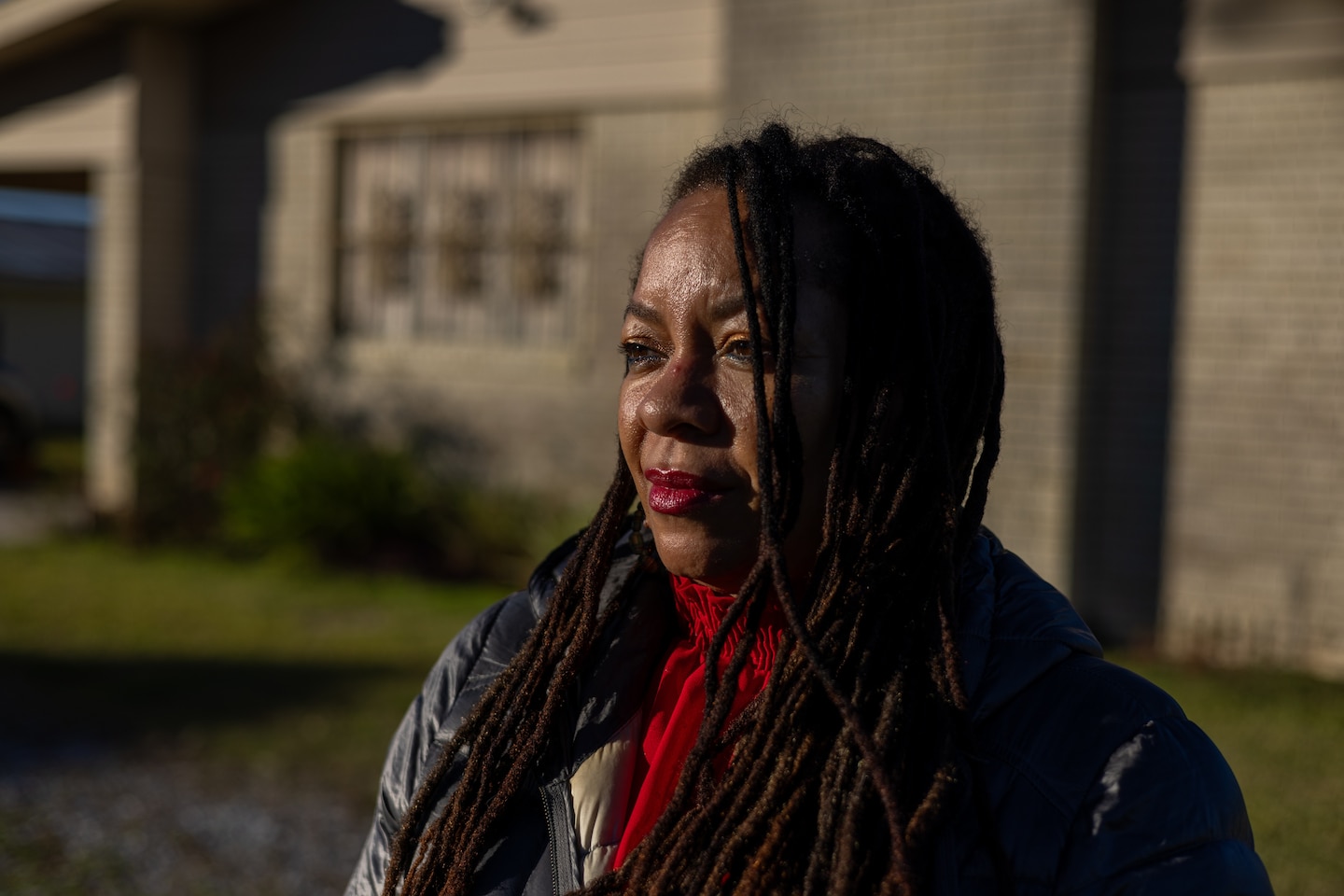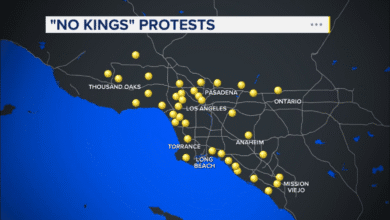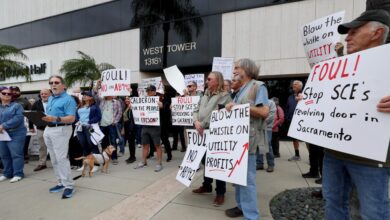Black voters in the South fight for equal say in redistricting cases

In Louisiana and other Southern states, African American residents are suing under the Voting Rights Act to reverse policies that they say dilute their power
“I don’t have the right to not vote,” Nairne, 57, said recently as trucks hauling sugar cane sped down the highway in front of her house in this rural village west of New Orleans.
Now, Nairne fears that her vote doesn’t carry the full weight it should because of how Republican lawmakers have drawn the state’s legislative and congressional districts.
She and other voters are suing to change those maps, joining a crush of litigation across the South that alleges Republican lawmakers illegally drew district lines to limit the power of minority voters. The outcome of the suits likely will influence which party controls the next Congress. The cases will also test how much a 58-year-old landmark of the civil rights era still matters.
Passed in 1965, the Voting Rights Act transformed who was eligible to enjoy the full rights of citizenship in the United States by effectively ending poll taxes and literacy tests like the ones Nairne’s family was forced to endure. It gave the Justice Department oversight of state voting laws in jurisdictions with a history of discrimination, most of them in the South, and helped expand Black representation to levels unseen during nearly a century of Jim Crow segregation.
But the potency of the Voting Rights Act has been eroded in recent years by the courts. Voting rights advocates view the decisions as a threat to the guarantee that all eligible voters can cast ballots and that people of color will get an equal say. Conservatives, who have led the push to weaken the law, say it is less necessary after generations of progress for minority groups.
A decade ago, the Supreme Court ended the Justice Department’s ability to preemptively veto election policies and maps that could disadvantage racial minorities. Supporters of the Voting Rights Act feared the law would suffer another major setback this summer via a case brought by Black voters in Alabama, and were surprised when the justices offered a reprieve — at least for now.
Then, just last month, judges from the U.S. Circuit Court of Appeals for the 8th Circuit ruled that private individuals and groups have no authority to bring challenges claiming that people of color have had their power minimized through state laws or redistricting maps. The decision, if upheld by the Supreme Court, would allow only the Justice Department to bring such suits and gut much of what remains of the Voting Rights Act’s enforcement powers.
The ruling does not directly affect Nairne’s cases, but Louisiana Republicans have sought to leverage it to argue that she lacks standing. In the meantime, her lawsuits, which were brought after she and other voters were recruited by the NAACP Legal Defense Fund and the American Civil Liberties Union, are going forward.
“It’s just like a heavyweight boxer,” said Clee Lowe, a Baptist pastor who is a plaintiff with Nairne. “The Voting Rights Act has staggered, but the fight isn’t over because we are going to go all the way to the final round.”
Across the country, courts are considering dozens of cases contesting whether lawmakers have unfairly drawn local, legislative and congressional lines.
On Tuesday the Supreme Court let stand a local map in Texas that a lower court determined watered down the strength of Black and Latino voters. Georgia lawmakers last week redrew the state’s congressional districts in response to a court order, but voting rights advocates argue the new lines still don’t comply with the law. In North Carolina, a lawsuit alleges lawmakers engaged in unconstitutional racial gerrymandering when they drew congressional districts. And state and federal courts are weighing whether a congressional district in northern Florida is in keeping with the law.
In all, congressional lines are being challenged in at least nine states, with the results expected to help determine who wields power on Capitol Hill beginning in 2025.
Many of the cases were brought by national organizations and are concentrated in the South, where advocates say Republican lawmakers deliberately diluted the voices of Black voters and prevented them from exercising their true power.
“The opposition knows what will happen if we awaken the sleeping giant. And it’s so important for them to keep us asleep,” said Omari Ho-Sang, the Louisiana organizing manager for Black Voters Matter.
Jason Snead, executive director of the conservative Honest Elections Project, called the Voting Rights Act an essential law but argued that liberals had abused it for partisan gain. He said only the Justice Department should have the authority to bring cases to ensure the lawsuits have legal merit.
“We have made exactly the sort of progress in voting and in our laws since 1965 that the people who wrote the Voting Rights Act hoped that we would,” he said. “There simply is not voter suppression on the scale that the left often alleges.”
A failing grade
Black voters in Louisiana have a majority in just one of the state’s six congressional districts, despite making up nearly a third of the statewide population. The Princeton Gerrymandering Project, which assesses congressional and legislative lines for fairness, gave Louisiana’s congressional map an F in racial representation.
In the state legislature, Black voters have majorities in about a quarter of the seats. There are now fewer Black lawmakers in the legislature than there were in 1872, during Reconstruction. Republicans have said they followed the law in drawing district lines. The districts must be redrawn after the Census every 10 years.
Louisiana is a solidly Republican state with an outsize influence on national politics. U.S. House Speaker Mike Johnson is from the state, as is U.S. House Majority Leader Steve Scalise. Conservatives hold two-thirds of the seats in the state legislature, giving them a supermajority that can override vetoes — as they did with their redrawn congressional maps.
In the legislature, Nairne is represented by a Black Democrat in the state Senate and a White Democrat in the Louisiana House. In Congress, Nairne is represented by Rep. Garret Graves, a White Republican whose district covers part of Baton Rouge and suburban and rural areas in southern Louisiana. His district wraps around much of the district of Rep. Troy Carter, a Black Democrat who represents majority-Black New Orleans and majority-Black neighborhoods of Baton Rouge.
U.S. District Judge Shelly D. Dick determined last year that the state’s congressional plan probably violates the Voting Rights Act. A panel of the U.S. Circuit Court of Appeals for the 5th Circuit recently upheld that decision and gave the legislature until January to draw a new map. It’s unclear whether legislative leaders will do so.
Outgoing Louisiana Senate President Page Cortez (R) said his Republican colleagues may leave it to the courts to draw a new map because lawmakers may not want to approve a new district that will be all but certain to send a Democrat to Congress.
“Does the new legislature want to be on the record voting to reduce the Republican representation in Congress?” he asked in a brief interview.
The case over the legislative maps is ongoing, and in court filings Republican lawmakers have argued the districts are in keeping with the Voting Rights Act because the number of Black-majority districts is roughly proportional to the state’s Black voting age population. Forty of the state’s 144 legislative districts, or 28 percent, have Black majorities.
Drawing more majority-Black legislative districts would dilute the voting strength of existing ones, making it harder in those areas to elect candidates supported by Black voters, the GOP lawmakers argued in their court filings.
Even if Nairne and the other voters are successful, Republicans will continue to maintain a large legislative majority. But those behind the suit say that legal victory could break up the Republicans’ veto-proof supermajority and give Black residents more say in how the state is run.
“If we can create these opportunities where the supermajority is no longer there, they have to talk to you now,” said Michael McClanahan, the president of the state NAACP. “If you’re not at the table where these policies are discussed, they’ll forget about you.”
State Rep. Cedric Glover (D) knew Republicans had the votes to draw the state’s maps as they saw fit, given their lock on the legislature. But during debate last year, he wanted to show them more Black districts were possible. He offered amendments to their plan and reminded them of the long struggle for Black representation in the state.
Throughout the South, the fight for the right to vote and equal participation in society continued long after the Civil War and the end of slavery. Black representation flourished in Louisiana and other southern states during Reconstruction, but that period came to a swift end in 1877 with the withdrawal of federal troops.
Nearly two decades later, the Supreme Court issued the Plessy v. Ferguson decision, which upheld a Louisiana law requiring Black people to ride in separate train cars and allowed segregation to continue for generations. In 1898, Louisiana adopted a new constitution with a poll tax, literacy test and other provisions that caused the number of Black registered voters in the state to drop from 130,000 to 1,000 within six years, according to the Louisiana Civil Rights Museum.
Standing behind the lectern in the well of the state House chamber, Glover, who has served five terms, held up a framed portrait of the state’s Black legislators in 1868, three years after the end of the Civil War.
“They were only able to come and become elected, seated members of these august bodies because the federal government came in and said, ‘You will no longer deny the right of Black men to vote,’” he said. “When that presence left, these men, they disappeared, didn’t show up again for decades. And even then, it was only because of the intervention of the federal government.”
That intervention came in the form of the Voting Rights Act, which was signed by President Lyndon B. Johnson in 1965 — three days before Glover was born. “I’m the first person in my family born with the full rights of an American citizen,” he said in an interview.
Two years after the Voting Rights Act, Louisiana voters elected the first Black person to the state legislature since Reconstruction.
But today, the racial divisions in Louisiana remain stark. The poverty rate is more than twice as high for Black Louisianans as White residents, and Black workers in the state earn, on average, 69 cents for every dollar made by White workers, according to federal data. Black students graduated high school at a rate nine points below White students in 2020, and the infant mortality rate is twice as high for Black residents as White residents.
Black lawmakers and activists have long pushed for increased education funding, expanded access to health care and overhauling the corrections system. But in recent years, they have put much of their attention on redistricting.
Glover said a larger presence in the state capitol would allow Black lawmakers to shape more legislation, consult more frequently with the governor and influence how department secretaries make decisions.
“Representation matters,” said Glover, who previously served as Shreveport’s first Black mayor. “You need numbers.”
The legal fight continues
The Louisiana cases are moving with renewed speed after being put on hold for a year as the Supreme Court weighed Alabama’s redistricting case.
Defying the expectations of court observers, the justices in June issued a 5-4 decision requiring the creation of a new congressional district where minority voters have a large enough share of the electorate to elect their candidate of choice. Republicans in the Alabama legislature refused to comply and forced federal judges to impose new maps for them.
Voting rights advocates saw the Alabama decision as an important victory because it came from a court dominated by Republican nominees who have been skeptical of aspects of the Voting Rights Act. The court’s 2013 decision in the Shelby County v. Holder case to weaken a key element of the law cleared the way for many GOP-controlled states to pass stricter voting laws and adopt district lines that benefited them.
Justin Levitt, a Loyola Law School professor who previously worked at the Justice Department and advised the Biden White House on voting policies, said the Shelby decision transformed how far state lawmakers were willing to go in drawing districts because the burden of proof shifted from legislatures to those questioning them.
“The legislature gets to fight like hell for the districts that they have drawn,” Levitt said. “And they’re fighting with taxpayer money. There’s no incentive whatsoever for them to compromise.”
More changes in redistricting policies are possible. The Supreme Court in October appeared skeptical of arguments that South Carolina had used race to skew district lines. Defenders argued the state had engaged in partisan gerrymandering, not racial gerrymandering, even though the two can often overlap. The Supreme Court in 2019 ruled that federal courts cannot consider partisan gerrymandering claims.
The case is one of the latest signs that fights over redistricting will continue. “I don’t expect anybody to lay down arms, not them and certainly not us,” said attorney Abha Khanna, who argued the Alabama case before the Supreme Court and is involved in one of the Louisiana cases.
For Nairne, the Louisiana lawsuit is a first step to a better life for the state’s Black residents. She grew up in Wisconsin, spent 20 years in South Africa doing HIV prevention work and moved to Napoleonville in 2016 to care for her elderly mother. She lives in the one-story house her aunt had owned, next to the Baptist church where her mother, aunt and grandparents are now buried.
In a region known for its sugar-cane farming, she is trying to start a business that would turn sugar-cane waste into disposable tableware, but has had trouble getting support. With more Black representation, start-ups like hers might get more attention, she said.
She joined the lawsuits in part because of the stories her mother, a first-grade teacher named Virginia Nairne, told her about studying for the literacy test with Nairne’s grandfather.
“He probably hadn’t been to third, fourth grade, if that. And they had to teach him how to spell ‘democracy,’ because you can’t register to vote if you cannot spell ‘democracy,’” Nairne said. “So now, how can we make sure this democracy is actually working?”
Clara Ence Morse contributed to this report.
This story is part of Imperfect Union, a series examining the ways Americans feel unrepresented by a political system struggling with a collision of forces both old and new.
Data reporting by Clara Ence Morse. Editing by Griff Witte. Copy editing by Colleen Neely. Project editing by KC Schaper. Photo editing by Natalia Jimenez. Design editing by Betty Chavarria. Data editing by Anu Narayanswamy.





